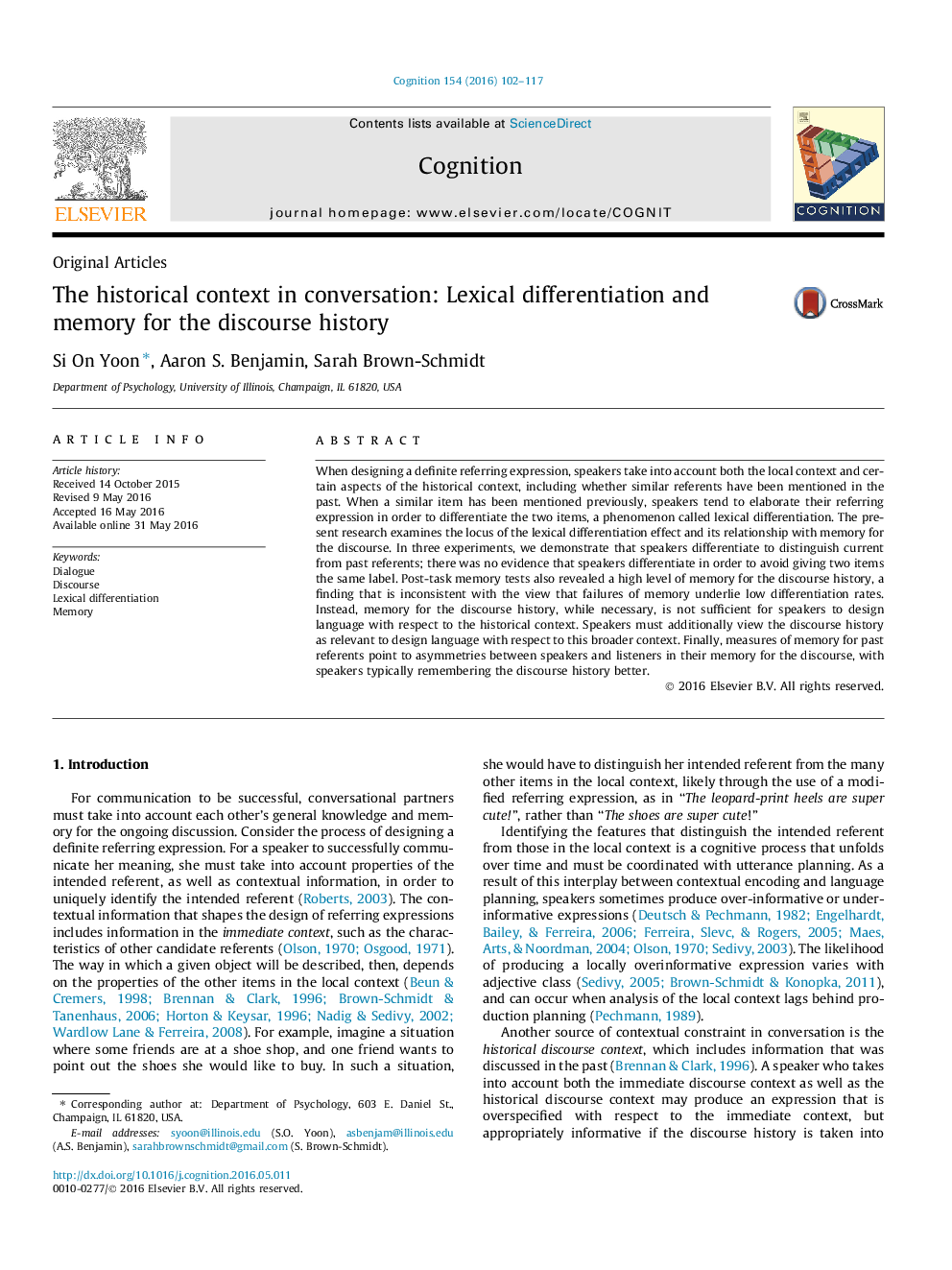| کد مقاله | کد نشریه | سال انتشار | مقاله انگلیسی | نسخه تمام متن |
|---|---|---|---|---|
| 7285915 | 1474113 | 2016 | 16 صفحه PDF | دانلود رایگان |
عنوان انگلیسی مقاله ISI
The historical context in conversation: Lexical differentiation and memory for the discourse history
ترجمه فارسی عنوان
زمینه تاریخی در گفتگو: تمایز و یادگاری واژگان برای تاریخ گفتمان
دانلود مقاله + سفارش ترجمه
دانلود مقاله ISI انگلیسی
رایگان برای ایرانیان
کلمات کلیدی
گفتگو، گفتمان تمایز واژگانی، حافظه،
ترجمه چکیده
سخنرانان هنگام طراحی یک اصطلاح ارجاع دقیق، به در نظر گرفتن هر دو زمینه محلی و جنبه های خاصی از زمینه تاریخی، از جمله اینکه آیا در گذشته اشاره شده است. وقتی یک آیتم مشابه قبلا ذکر شده است، سخنرانان تمایل دارند بیان اصطلاحی خود را برای تفسیر دو مورد، پدیده ای به نام تمایز واژگانی بیان کنند. تحقیق حاضر به بررسی وظیفه اثر افتراق واژگانی و ارتباط آن با حافظه برای گفتمان می پردازد. در سه آزمایش، ما نشان می دهیم که سخنرانان برای تمایز فعلی از ارجاعات گذشته تمایز قائل می شوند؛ شواهدی وجود ندارد که سخنرانان به منظور جلوگیری از دادن دو علامت به همان برچسب، تمایز قائل شوند. تست های حافظه پس از کار نیز سطح حافظه ای را برای تاریخ گفتمان نشان دادند، که نتیجه ای ناسازگار با این نکته است که ناکامی های حافظه، نرخ پایین تمایز را پایه ریزی می کند. در عوض، حافظه برای تاریخ گفتمان، در حالی که لازم است، برای سخنرانان برای طراحی زبان با توجه به زمینه تاریخی کافی نیست. سخنرانان باید تاریخچه گفتمان را در رابطه با زبان طراحی با توجه به این زمینه گسترده تر مشاهده کنند. در نهایت، اندازه گیری های حافظه برای ارجاعات گذشته نشان دهنده عدم تقارن بین سخنرانان و شنوندگان در حافظه آنها برای گفتمان است، و سخنرانان به طور معمول تاریخ گفتمان را به یاد می آورند.
موضوعات مرتبط
علوم زیستی و بیوفناوری
علم عصب شناسی
علوم اعصاب شناختی
چکیده انگلیسی
When designing a definite referring expression, speakers take into account both the local context and certain aspects of the historical context, including whether similar referents have been mentioned in the past. When a similar item has been mentioned previously, speakers tend to elaborate their referring expression in order to differentiate the two items, a phenomenon called lexical differentiation. The present research examines the locus of the lexical differentiation effect and its relationship with memory for the discourse. In three experiments, we demonstrate that speakers differentiate to distinguish current from past referents; there was no evidence that speakers differentiate in order to avoid giving two items the same label. Post-task memory tests also revealed a high level of memory for the discourse history, a finding that is inconsistent with the view that failures of memory underlie low differentiation rates. Instead, memory for the discourse history, while necessary, is not sufficient for speakers to design language with respect to the historical context. Speakers must additionally view the discourse history as relevant to design language with respect to this broader context. Finally, measures of memory for past referents point to asymmetries between speakers and listeners in their memory for the discourse, with speakers typically remembering the discourse history better.
ناشر
Database: Elsevier - ScienceDirect (ساینس دایرکت)
Journal: Cognition - Volume 154, September 2016, Pages 102-117
Journal: Cognition - Volume 154, September 2016, Pages 102-117
نویسندگان
Si On Yoon, Aaron S. Benjamin, Sarah Brown-Schmidt,
